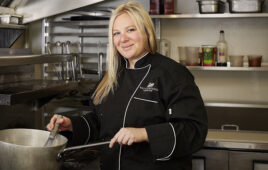 Picture this: A member walks into the pub area of the restaurant in the clubhouse. He sees the green-felt-covered table tucked away in the corner with four women sitting in an orderly fashion as they play a game of bridge. He looks at the women, makes a little grunting noise under his breath and says out loud, “I see four empty kitchens” and laughs with disdain. I had two servers come into the kitchen that day completely irate after witnessing this. One server was a woman and the other was a man. Both were equally disturbed after hearing this. My only response of utter disgust was, “Ewwwwwww,” followed by, “He’s pretty lucky I wasn’t out there to hear him say that.”
Picture this: A member walks into the pub area of the restaurant in the clubhouse. He sees the green-felt-covered table tucked away in the corner with four women sitting in an orderly fashion as they play a game of bridge. He looks at the women, makes a little grunting noise under his breath and says out loud, “I see four empty kitchens” and laughs with disdain. I had two servers come into the kitchen that day completely irate after witnessing this. One server was a woman and the other was a man. Both were equally disturbed after hearing this. My only response of utter disgust was, “Ewwwwwww,” followed by, “He’s pretty lucky I wasn’t out there to hear him say that.”
Unfortunately, this is my world. My point is, if a woman’s place is in the kitchen, then let us be! As a woman coming up in this industry, I have to say with brutal honesty that I have endured some serious bullshit no man would ever put up with. When I was first hired on at Glenmoor Country Club(Cherry Hills Village, Colo.), I was the only woman hired on to join the team of about twelve men, including the Chef and Sous Chef. Of these men, only one of them was kind to me.
As much as I tried to fit in with the team, I was usually picked on by several staff members who dominated the line at the time. And one who always took it upon himself to ‘accidentally’ touch my ass every time he walked by me. It escalated to the point where one of them felt it was okay to literally pin me up against the back prep table while the rest of them laughed and cheered him on. When I finally decided to report him to my Chef, I was told by the Chef that this cook meant no harm, that he was just joking around and that’s what cooks do in kitchens and that I shouldn’t be so sensitive.
I had the greatest pleasure in terminating this individual’s employment once I stepped into my first management role. He was my first. Eventually, I made sure we had a complete staff turnover. Is this a case of a woman scorned? Or just a smart Chef building a better team?
Rewind back several years ago when The Food Network began its infamous influence on the American household’s frame of mind regarding food and cuisine and chefs. Like any other television network, characteristics of the show and audience type signified whether the show was slated for daytime television or primetime television. Daytime television, of course, was marketed towards women and stay at home mothers. Primetime television slots were geared for the man of the house, the breadwinner, the one financially responsible for the well-being of his family.
Daytime television on The Food Network was filled with the likes of Sandra Lee’s “Semi-Homemade Cooking” showcasing how to take convenience items and turn them into quick and easy weekday dinners. Rachel Ray’s 30-minute meals was geared toward the same end result. Paula Deen’s Southern Home Cooking was designed to make ease out of old southern style family dinners. Meanwhile, primetime television shows included the likes of Emeril Lagasse, Iron Chef, and Bobby Flay. What’s more notable is that the women featured during the daytime slots were outfitted in normal everyday attire donned with a pretty lace embroidered apron in a studio kitchen designed to look like the home kitchen. The men, on the other hand, were in their pressed, starched white chef’s coats and crisp white aprons; cooking in front of a live studio audience teleprompted to “ooh” and “ahh” and applaud with every addition of garlic or “bam!” in a studio kitchen designed to look like a professional kitchen.
Unfortunately, The Food Network’s lineup furthered the stigma that “women make good cooks, but men make better chefs.”
It’s incredible to me that after taking the reign of Executive Chef over thirteen years ago I am still challenged with gaining equal recognition as a Chef in this industry. A couple of months ago, I was interviewing an older gentleman for a position to join my team. This individual was courteous and respectful for the duration of our email communications setting up the details for the interview, starting every communication with “Yes, Chef” and ending each with “Thank you, Chef.” As eager as I was to interview this gentleman for consideration, there was a major shift in his respect for me the minute we met face to face. His demeanor was of sheer condescension, almost disgust at the fact that any potential employment with this company was in my hands.
I invited my Executive Sous Chef to join me for the interview as I had wanted his perspective on how this individual would fit in on the team. The minute my Sous Chef joined us, this gentleman’s demeanor changed once again. Not only was he excited and eager to discuss his experience, he was as courteous and respectful towards my Exec Sous as he once was with me through email. Not once during our interview did he address me as “Chef,” rather he felt compelled to call me, “Ma’am,” if anything at all. Each time I asked a question, he would either address it to “Ma’am” or give me a quick two-word response. Other times, he would reply to my question while addressing it towards my Sous Chef starting with, “Chef, let me tell you blah, blah, blah…” He must’ve addressed my Sous Chef as ‘Chef’ at least eighteen times in the short duration of our interview while never once addressing me as such. I found the whole scenario amusing until my Sous Chef shared the same sentiment once the interview was over. He asked me, “I think he’ll fit in great with the team, but do you think he’ll be okay with you as his Chef? Because I don’t think he’s okay with that.”
More recently, in what is now a common struggle amongst Chef’s to recruit and get fully staffed, I was speaking to a young woman about a potential opportunity on my team. Currently, she works at one of the busy trending restaurants here in downtown Denver for a very well-known Chef with numerous outlets across the Denver metro area. Although holding down a very good position, she’s not happy working with this particular Chef and his all male team. She complained about their treatment and condescension towards her. When I offered her a position on my team, she hesitated only because she was afraid of having to move up the ranks again starting with a new company. She said most other places she’s worked she has been kept as the ‘pantry girl’ for far longer than most of her male counterparts who had started around the same time as she did. It’s disturbing that as a talented chef, she’s choosing to endure the mistreatment to maintain her rank in a professional kitchen.
Needless to say, my current management style is one that fosters a much more supportive and nurturing environment for each individual team member’s goals and professional growth; whether male or female. It’s wonderful to see that there has been an increase in the number of women successfully running professional kitchens across the country. Ultimately, it is my belief that if you have the desire and the backbone to succeed in this industry, then nothing—and no one—will stop you.



